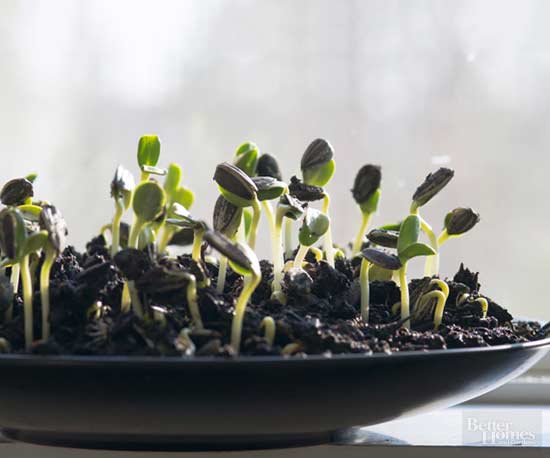






1. Place 1 to 4 tablespoons of seeds in a wide-mouth jar.
2. Cover with mesh netting and secure with a rubber band or screw-top metal canning ring.
3. Rinse the seeds with lukewarm water. Swirl and drain. For best results, use only nonchlorinated water. Chlorine in city water can cause poor sprouting.
4. Add 1 cup lukewarm water. Soak 12 to 24 hours.
5. Drain the water.
6. Rinse seeds twice a day with lukewarm to cool water, swirling to ensure all seeds are rinsed.
7. Drain excess water after each rinsing to prevent seeds from fermenting and spoiling. If your seeds are not sprouting or if they smell funny, you're not draining off enough water.
8. Keep the jar at room temperature (68 to 72 degrees F). Keep the jar outside cabinets; seeds need air circulation. For seeds such as mung beans that prefer a darker environment -- see package directions -- wrap jars with foil or paper but leave the top open. Lay the jars on their sides to give seeds more room to spread out.
9. In 3 to 6 days, when sprouts are about 1 to 2 inches long, depending on the variety, rinse thoroughly with water before eating.
10. Dry unused sprouts. They keep in a covered container in the refrigerator for 1 to 2 weeks.
As sprouts grow, you'll see fuzzy white root hairs growing from radish, canola, mustard, and other cruciferous seeds. When you rinse them off, the hairs appear to disappear, but they're really just mashed up against the sprout with water.
Taste sprouts as you grow them, and use them up when you like them best.
To green up sprouts, leave them without a cover for a few hours in bright -- but not direct -- sunlight.
Sprouts are low in fat, contain no cholesterol, and provide protein, vitamins, and minerals.
To use, toss sprouts into scrambled eggs or omelets, salads, sandwiches, wraps, stir-fries, and soups. Add them just before serving so they stay crisp. Stir sprouts into bread dough right before baking.
Because it only takes about 10 days to grow sprouts, you can keep a successive crop going all the time, even in the winter.
Health food stores, mail-order seed companies, food co-ops, and supermarkets often stock seeds specifically for sprouting. Avoid seeds labeled for garden use; they may be coated with fungicides.
Copyright © www.100flowers.win Botanic Garden All Rights Reserved